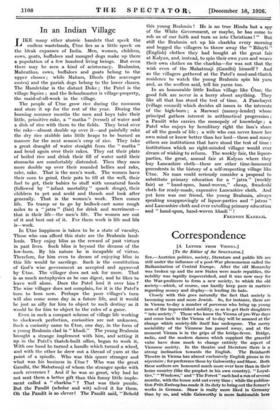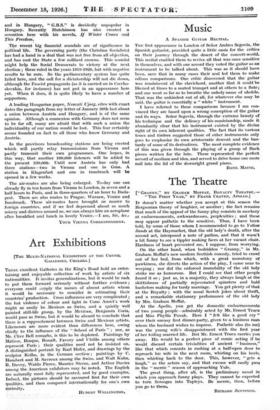Correspondence
[A LETTER FROM VIENNA.]
[To the Editor of the SPECTATOR.] SIR,—Austrian politics, society, literature and public life are still under the influence of a post-War phenomenon called the Balkanization of Central Europe. After the old Monarchy was broken up and the new States were made republics, the nobility was rapidly impoverished, and it was now easy for the War-profiteers to form a new society, to which the old society—which, of course, can hardly keep pace in matters regarding money and display—is lending its halo.
Closely with this goes naturally the fact that society is becoming more and more Jewish. So, for instance, there are in Vienna to-day a number of parvenus who bring up young men of the impoverished nobility, so as to get their daughters " into society." Those who know the Vienna of pre-War days and come back to the Vienna of to-day will be amazed at the change which society-life itself has undergone. The merry sociability of the Viennese has passed away, and at the moment Vienna is in the grips of the bridge-fever. Bridge, radio, and the modern dances which supplant the graceful valse have done much to change entirely the aspect of Viennese society. In the theatre and literature there is a strong inclination towards the English." The Reinhardt Theatre in Vienna has almost exclusively English pieces in its repertoire ; for preference those by Galsworthy and Shaw. Both these authors are honoured much more over here than in their home country (like the prophet in his own country). " Loyal- ties," " Windows," and" The Forest" each had a run of several months, with the house sold out every time ;. while the publica- tion Fritz Zsolnay has made it its duty to bring out the former's works in German. Shaw is really more liked in Germany than by us, and while Galsworthy is more fashionable here
and in Hungary, " G.B.S." is decidedly unpopular in Hungary. Recently Hutchinson has also 'created a sensation here with his novels, If Winter Comes and This Freedom.
The recent big financial scandals are of significance in political life. The governing party (the Christian Socialists) has had a hand in a deal that was not free from all objection, and has cost the State a few milliard crowns. This scandal might help the Social Democrats to victory at the next election ; these ruled in the years 1919-1920, but with negative results to be sure. So the parliamentary system has quite failed here, and the call for a dictatorship will not die down, although the Fascist propaganda (as it is carried on in Czecho- slovakia, for instance) has not put in an appearance here yet. When it does, it is quite likely to have a number of supporters.
A leading Hungarian paper, Nemzeti Ujsdg, cites with exact dates the paragraph from my letter of January 30th last about a union between Austria and Hungary, and is of the same opinion. Although a. connexion with Germany does not seem to be far off; many are afraid that with such a union the individuality of our nation would be lost. This fear certainly seems founded on fact to all those who know Germany and Austria.
In the provinces broadcasting stations are being erected which will partly relay transmissions from Vienna and partly transmit their own programmes. One hopes, in this way, that another 100,000 listeners will be added to the present 230,000. Until now Austria has only had three stations—two in Vienna and one in Graz. A station in Klagenfurt and one in Innsbruck will ' be opened in a few weeks.
The air-routes are also being enlarged. To-day one can already fly in ten hours from Vienna to London, in seven and a half hours to Paris, and in three-quarters of an hour to Buda- pest. There are also routes to Prague, Warsaw, Venice and Innsbruck. These " air-routes have brought us nearer to foreign countries, and if we feel depressed about so much misery and distress around us, we can always hire an aeroplane after breakfast and lunch in lovely Venice.—I am, Sir, &c.,
Your:, VIENNA CORRESPONDENT.











































 Previous page
Previous page